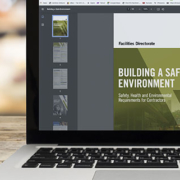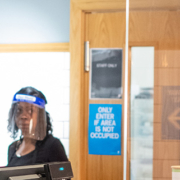Accessible websites and documents
One in five people in the UK have a disability (visual, hearing, motor or cognitive) that could make it difficult for them to access the online information. Additionally, more young people with registered disabilities are entering Higher Education than ever before. It is therefore crucial that University services can be used by as many customers as possible, communications are effective, and nobody is excluded from accessing important information.
The FD Marketing, Sales and Communications team, working with the Central Communications team and IT Services, set about creating a customer focused culture across all FD services to highlight the critical importance of digital communications being accessed by more people. This was implemented by making all websites and online documents accessible to as many customers as possible, ensuring they conformed to government guidance, and specifically achieving Web Content Accessibility Guidelines (WCAG) 2.1, level AA.
In collaboration with IT Services, the team identified the websites and services that failed the accessibility standard and implemented a three-stream approach (websites the team could move into IT’s accessible ‘Design System’ project; websites that fell outside of this system due to additional functionality requirements; and documents uploaded to websites that were not accessible) to making the improvements. As a result, significant improvements were made to the documents visible on all customer-facing websites in addition to auditing online documents and making necessary fixes to make them accessible. Once work was completed across all three project streams, the team delivered training and advice to clients.
Furthermore, the team worked hard with internal customers and stakeholders to improve the process of creating “designed documents for web” to further embed its commitment to accessible documents. For instance, the team worked with FD Health and Safety to produce an updated and fully accessible PDF document detailing University health and safety standards for contractors. A fully digital document proved useful as it could be easily updated, was more cost effective for the team, and easier to use for Contractors, who were able to navigate quickly to the relevant sections.
Significant improvements were made to the FD’s three commercial websites (catering, sport and conferencing) and the team continue to work with IT to test and measure the improvements on a regular basis.
Web accessibility will remain an ongoing priority for the FD Marketing, Sales and Communications team. The team continue to work across the University with IT, Disability Services and Central Communications to continuously improve communications and ensure online services can be used by as many customers as possible.




